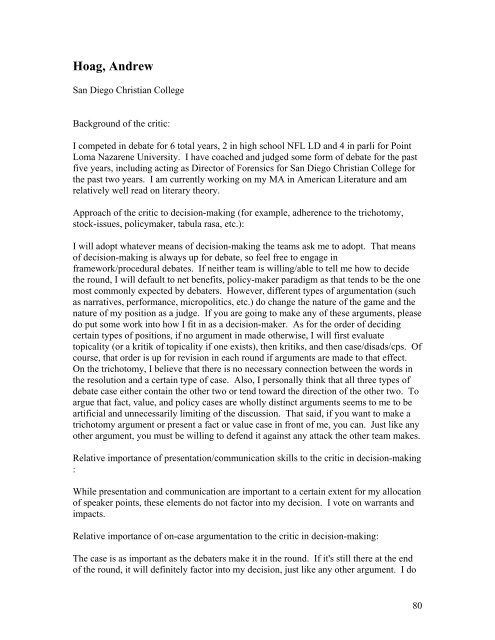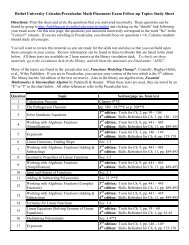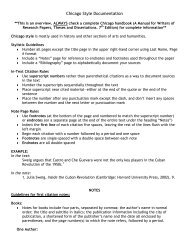here - College of Arts & Sciences - Bethel University
here - College of Arts & Sciences - Bethel University
here - College of Arts & Sciences - Bethel University
You also want an ePaper? Increase the reach of your titles
YUMPU automatically turns print PDFs into web optimized ePapers that Google loves.
Hoag, Andrew<br />
San Diego Christian <strong>College</strong><br />
Background <strong>of</strong> the critic:<br />
I competed in debate for 6 total years, 2 in high school NFL LD and 4 in parli for Point<br />
Loma Nazarene <strong>University</strong>. I have coached and judged some form <strong>of</strong> debate for the past<br />
five years, including acting as Director <strong>of</strong> Forensics for San Diego Christian <strong>College</strong> for<br />
the past two years. I am currently working on my MA in American Literature and am<br />
relatively well read on literary theory.<br />
Approach <strong>of</strong> the critic to decision-making (for example, ad<strong>here</strong>nce to the trichotomy,<br />
stock-issues, policymaker, tabula rasa, etc.):<br />
I will adopt whatever means <strong>of</strong> decision-making the teams ask me to adopt. That means<br />
<strong>of</strong> decision-making is always up for debate, so feel free to engage in<br />
framework/procedural debates. If neither team is willing/able to tell me how to decide<br />
the round, I will default to net benefits, policy-maker paradigm as that tends to be the one<br />
most commonly expected by debaters. However, different types <strong>of</strong> argumentation (such<br />
as narratives, performance, micropolitics, etc.) do change the nature <strong>of</strong> the game and the<br />
nature <strong>of</strong> my position as a judge. If you are going to make any <strong>of</strong> these arguments, please<br />
do put some work into how I fit in as a decision-maker. As for the order <strong>of</strong> deciding<br />
certain types <strong>of</strong> positions, if no argument in made otherwise, I will first evaluate<br />
topicality (or a kritik <strong>of</strong> topicality if one exists), then kritiks, and then case/disads/cps. Of<br />
course, that order is up for revision in each round if arguments are made to that effect.<br />
On the trichotomy, I believe that t<strong>here</strong> is no necessary connection between the words in<br />
the resolution and a certain type <strong>of</strong> case. Also, I personally think that all three types <strong>of</strong><br />
debate case either contain the other two or tend toward the direction <strong>of</strong> the other two. To<br />
argue that fact, value, and policy cases are wholly distinct arguments seems to me to be<br />
artificial and unnecessarily limiting <strong>of</strong> the discussion. That said, if you want to make a<br />
trichotomy argument or present a fact or value case in front <strong>of</strong> me, you can. Just like any<br />
other argument, you must be willing to defend it against any attack the other team makes.<br />
Relative importance <strong>of</strong> presentation/communication skills to the critic in decision-making<br />
:<br />
While presentation and communication are important to a certain extent for my allocation<br />
<strong>of</strong> speaker points, these elements do not factor into my decision. I vote on warrants and<br />
impacts.<br />
Relative importance <strong>of</strong> on-case argumentation to the critic in decision-making:<br />
The case is as important as the debaters make it in the round. If it's still t<strong>here</strong> at the end<br />
<strong>of</strong> the round, it will definitely factor into my decision, just like any other argument. I do<br />
80
















